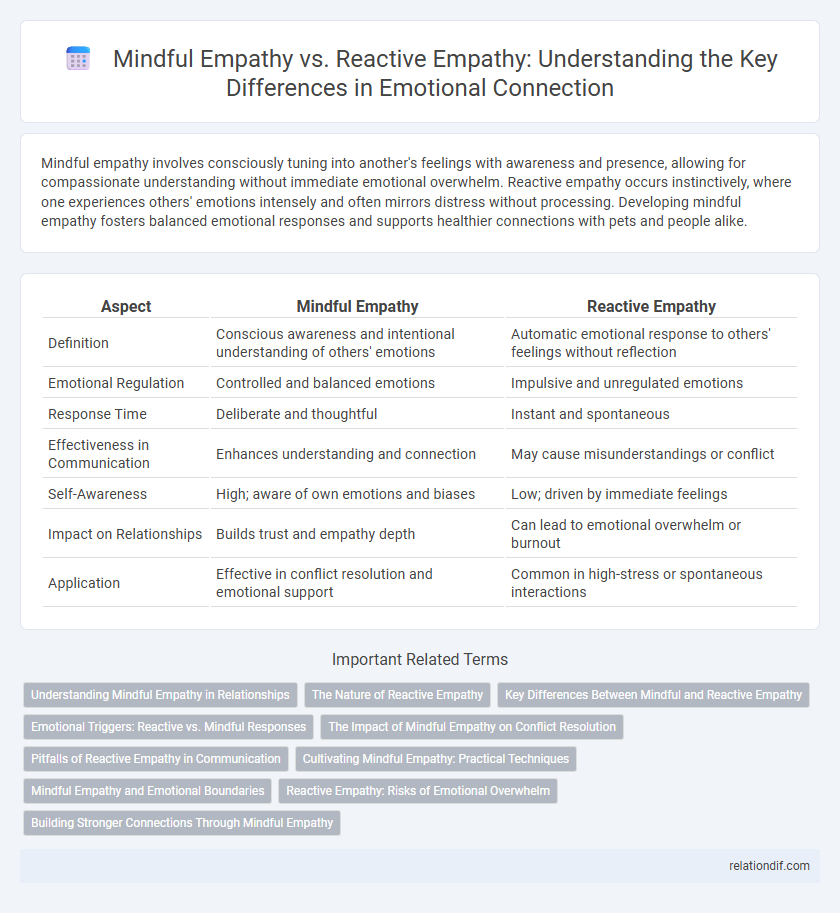Mindful empathy involves consciously tuning into another's feelings with awareness and presence, allowing for compassionate understanding without immediate emotional overwhelm. Reactive empathy occurs instinctively, where one experiences others' emotions intensely and often mirrors distress without processing. Developing mindful empathy fosters balanced emotional responses and supports healthier connections with pets and people alike.
Table of Comparison
| Aspect | Mindful Empathy | Reactive Empathy |
|---|---|---|
| Definition | Conscious awareness and intentional understanding of others' emotions | Automatic emotional response to others' feelings without reflection |
| Emotional Regulation | Controlled and balanced emotions | Impulsive and unregulated emotions |
| Response Time | Deliberate and thoughtful | Instant and spontaneous |
| Effectiveness in Communication | Enhances understanding and connection | May cause misunderstandings or conflict |
| Self-Awareness | High; aware of own emotions and biases | Low; driven by immediate feelings |
| Impact on Relationships | Builds trust and empathy depth | Can lead to emotional overwhelm or burnout |
| Application | Effective in conflict resolution and emotional support | Common in high-stress or spontaneous interactions |
Understanding Mindful Empathy in Relationships
Mindful empathy in relationships involves a conscious awareness and deep understanding of another person's emotions without immediate judgment or reaction, promoting genuine connection and emotional support. Unlike reactive empathy, which is often impulsive and driven by one's own emotions, mindful empathy requires deliberate presence and active listening, fostering trust and mutual respect. This approach enhances emotional regulation and strengthens relational bonds by prioritizing thoughtful responses over automatic emotional reactions.
The Nature of Reactive Empathy
Reactive empathy is characterized by an immediate emotional response to another's feelings, often leading to personal distress and impulsive reactions. This form of empathy is driven by mirror neurons that trigger automatic mimicry of emotions without conscious regulation. Understanding the nature of reactive empathy highlights the importance of developing mindful empathy to foster balanced emotional engagement and reduce emotional overwhelm.
Key Differences Between Mindful and Reactive Empathy
Mindful empathy involves conscious awareness and regulation of one's emotional responses, allowing for thoughtful and balanced understanding of others' feelings. Reactive empathy, by contrast, triggers immediate, automatic emotional reactions that can overwhelm and hinder objective comprehension. The key differences lie in mindfulness fostering emotional resilience and intentional connection, whereas reactivity risks emotional contagion and impulsive responses.
Emotional Triggers: Reactive vs. Mindful Responses
Reactive empathy often leads to immediate emotional triggers, causing automatic responses based on personal biases and unresolved feelings. Mindful empathy involves recognizing these emotional triggers consciously, allowing for a more deliberate, compassionate reaction that prioritizes understanding over judgment. This practice cultivates emotional regulation and deeper connection by transforming impulsive reactions into thoughtful engagement.
The Impact of Mindful Empathy on Conflict Resolution
Mindful empathy enhances conflict resolution by fostering deep understanding and emotional regulation, allowing individuals to respond thoughtfully rather than react impulsively. This approach reduces miscommunication and defensiveness, creating a collaborative environment for problem-solving. Research indicates that mindful empathy improves interpersonal trust and promotes lasting agreements in both personal and professional conflicts.
Pitfalls of Reactive Empathy in Communication
Reactive empathy often leads to emotional overwhelm and blurred boundaries because individuals may absorb others' distress without discerning their own feelings. This lack of mindful awareness can result in miscommunication and hinder effective problem-solving, as reactions are driven by immediate emotional responses rather than thoughtful understanding. Overreliance on reactive empathy can cause burnout and reduce genuine connection in interpersonal communication, limiting the ability to respond compassionately and constructively.
Cultivating Mindful Empathy: Practical Techniques
Cultivating mindful empathy involves practices like active listening, deep breathing exercises, and reflective journaling to enhance emotional awareness and present-moment engagement. These techniques help individuals respond thoughtfully rather than react impulsively, fostering genuine understanding and connection. Mindful empathy promotes emotional regulation and compassion, which are critical for building trust and strengthening interpersonal relationships.
Mindful Empathy and Emotional Boundaries
Mindful empathy emphasizes a balanced awareness of others' emotions while maintaining clear emotional boundaries to prevent personal overwhelm. This approach fosters compassionate understanding without absorbing negative feelings, promoting healthier relationships and emotional resilience. Developing mindful empathy involves practicing active listening and self-regulation to stay present without becoming reactive.
Reactive Empathy: Risks of Emotional Overwhelm
Reactive empathy often leads to emotional overwhelm due to an immediate and intense absorption of others' feelings without sufficient emotional boundaries. This heightened sensitivity can result in burnout, increased stress, and impaired decision-making. Managing reactive empathy requires cultivating awareness and strategies to prevent emotional exhaustion and maintain mental resilience.
Building Stronger Connections Through Mindful Empathy
Mindful empathy enhances relationships by encouraging presence and deep understanding, allowing individuals to respond thoughtfully rather than impulsively. Reactive empathy often triggers automatic emotional reactions that can cloud judgment and escalate conflicts. Prioritizing mindful empathy fosters stronger connections by promoting active listening, emotional regulation, and genuine compassion.
mindful empathy vs reactive empathy Infographic

 relationdif.com
relationdif.com